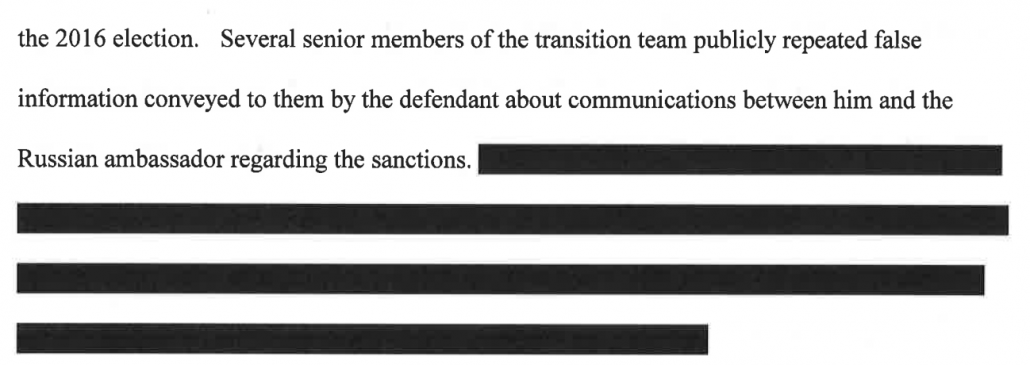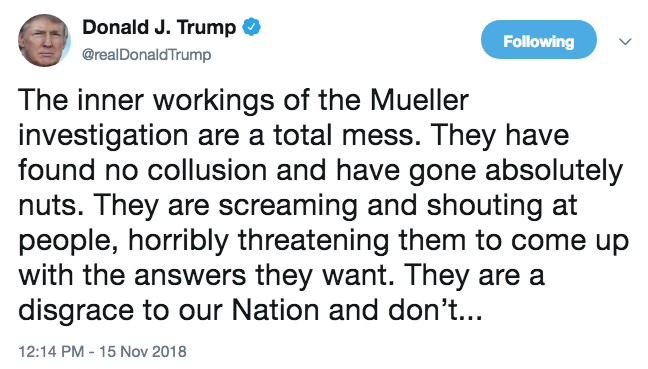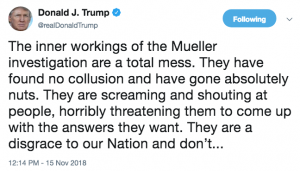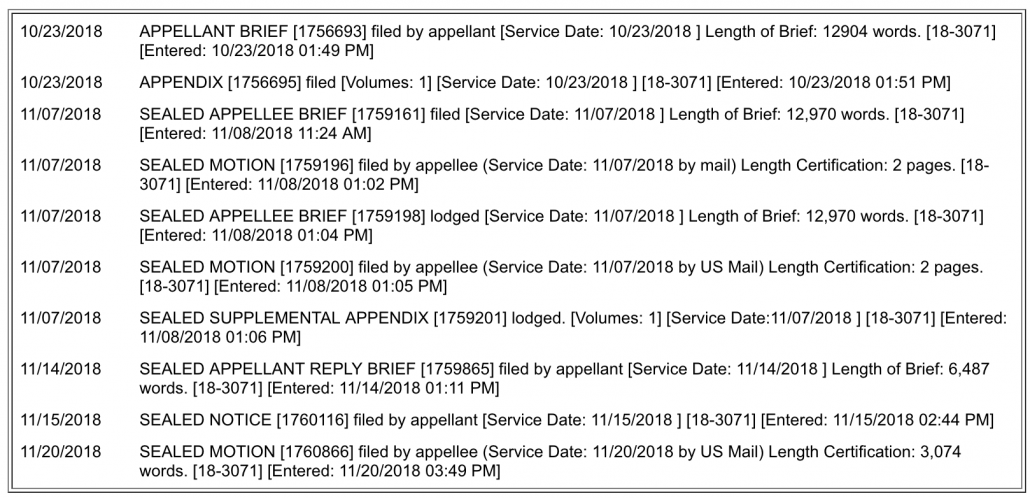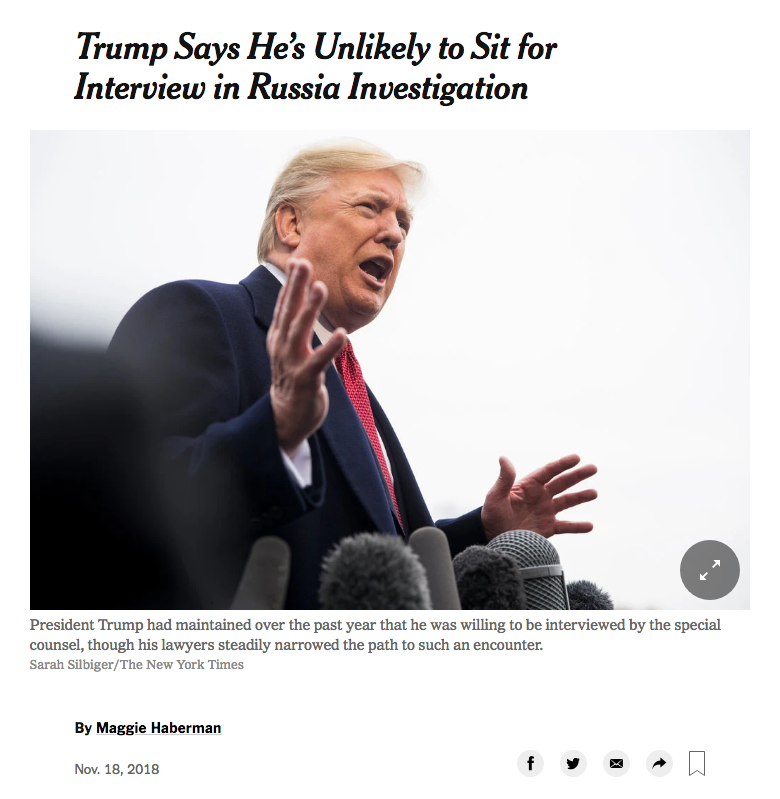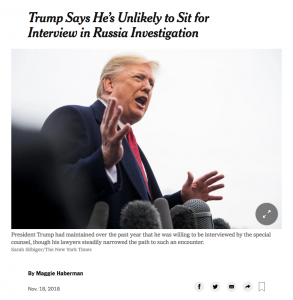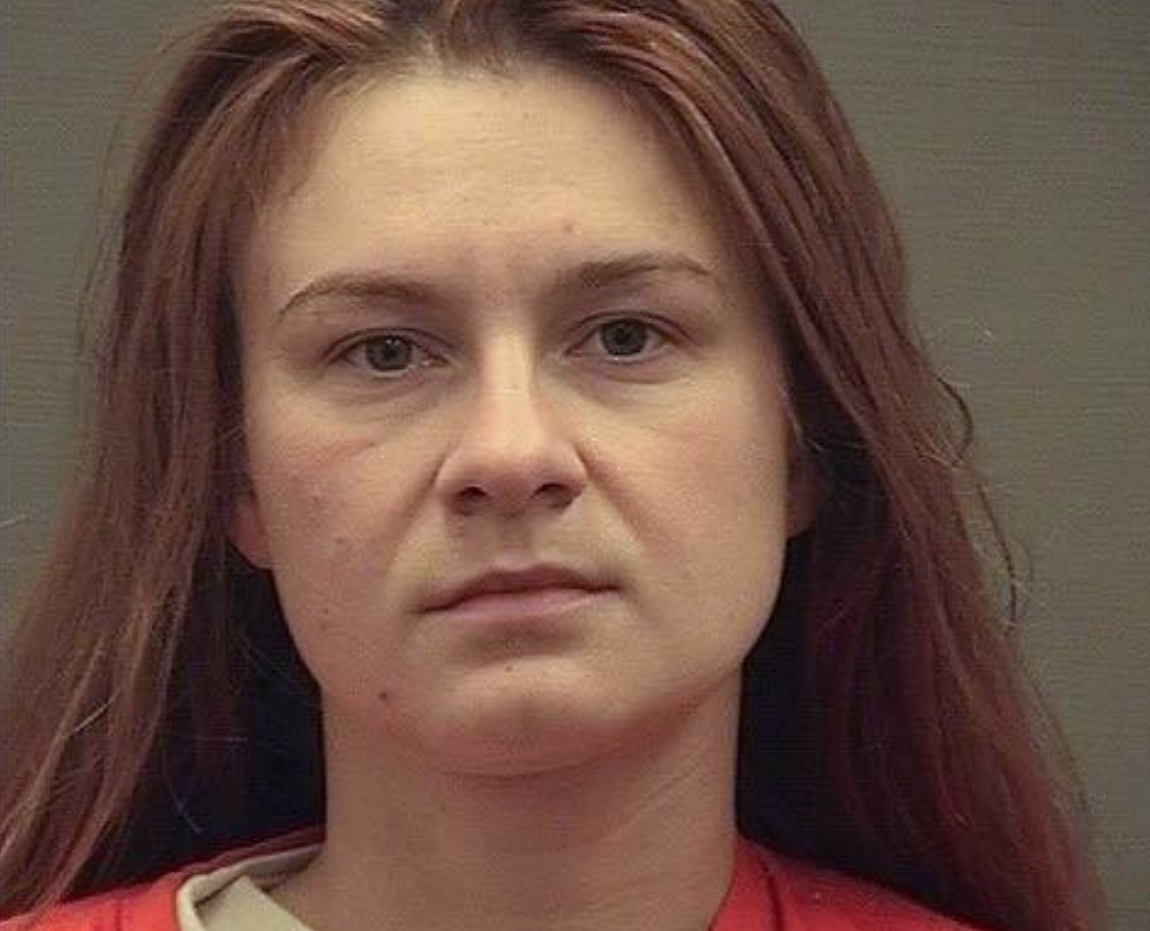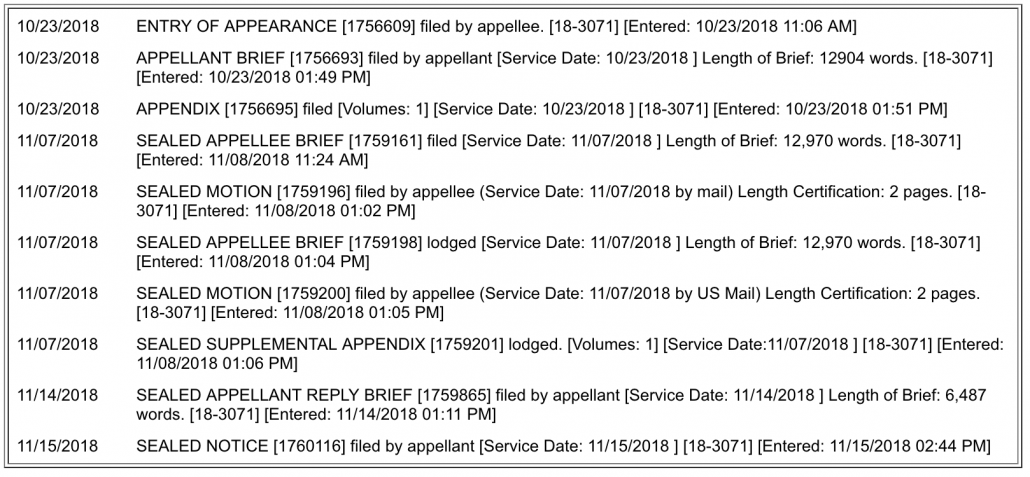One detail from Paul Manafort’s status hearing yesterday did not surprise me: Andrew Weissmann said he was “ready to go immediately with his filing of details on Manafort’s alleged breach” of his plea agreement. (Judge Amy Berman Jackson gave him a week, until December 7, to do so).
Weissmann plays coy about next steps
One detail surprised me a bit: Weissmann claimed the government hasn’t decided whether they’ll further charge Manafort.
Jackson asked Weissmann if the government planned to bring more charges against Manafort after noting that the report by prosecutors earlier this week repeatedly used the word “crimes” in describing new allegations against Manafort.
The “report seems to make a point with its vocabulary,” Jackson said.
Weissmann said they hadn’t made a decision yet, but that they did believe Manafort’s conduct would be relevant at sentencing on the charges he already pleaded guilty to.
It’s not really clear from the reporting precisely what the government would charge him with, either: either the hung charges from EDVA, those that had been dropped in DC, or something else.
I’m spitballing, of course, but the two details together suggest that while Mueller has a very specific story to tell about Manafort ready to go, they haven’t decided where to go once they tell that story — whether they plan to pressure him some more to provide evidence on the things he has lied about, or perhaps charge him in the case in chief. We’re not, then, getting the full Mueller report, but I expect we’ll get some fairly interesting accusations and — given past practice from this team — some primary evidence to back up those claims. Further, given Kevin Downing’s claim to be mystified about the substance of Manafort’s lies, I suspect the Manafort (and Trump) team will get specifics about what Mueller knows that they’re not yet aware of.
Mueller’s slow reveal
When they’ve laid out such details in the past, the Mueller team has significantly advanced the long slow process of getting Manafort to describe what really happened in 2016. Early on, they used a redlined copy of an op-ed Manafort did with Konstantin Kilimnik to argue that Manafort had violated the gag in the case; while revealing that op-ed didn’t elicit sanctions on Manafort, it put Manafort in a weaker spot with ABJ. It also may have been how Manafort learned that the government had (probably in mid-August 2017, so in the wake of the raid on his condo) seized the content of the email account he used to communicate with Kilimnik.
Then, for months, the government let Manafort submit one after another attempt to make bail. And only when he had finally done so, they moved to revoke bail by slapping on two additional obstruction charges. To substantiate those charges (in yet another speaking indictment), they not only revealed that Manafort and Kilimnik had tried to convince witnesses to lie about past work with Manafort, but in the process they revealed they had collected and parallel constructed both men’s WhatsApp and Telegram chats (and had, presumably, parallel constructed Manafort’s communications with Kiliminik going back over two years, importantly for our purposes, including the entire time period Manafort worked on Trump’s campaign).
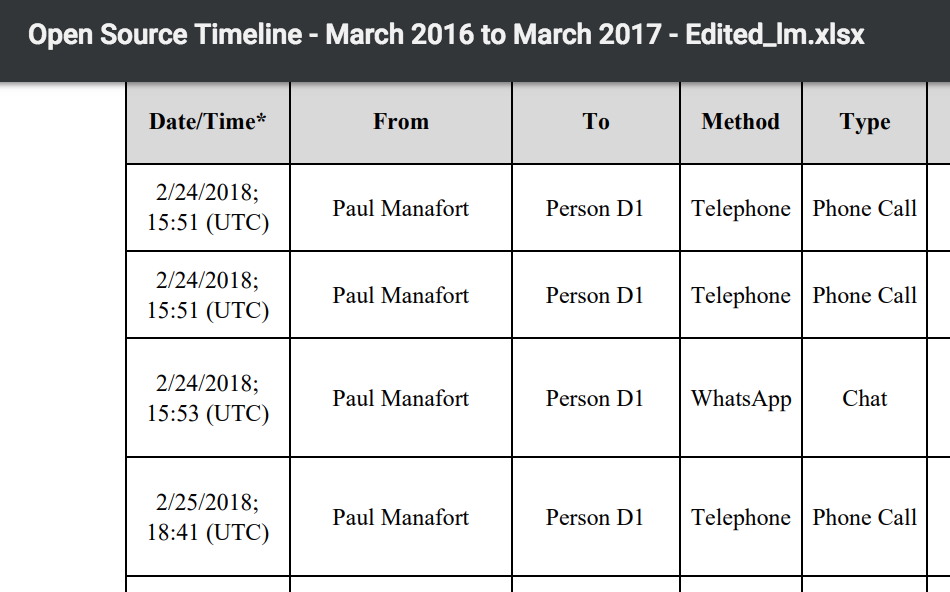
Given all the discussion Friday about further indictments, it’s instructive that rather than just submitting a motion to revoke bail last June, the government had the grand jury indict those two new charges, with the effect that they didn’t have to call the Hapsburg witnesses publicly to describe the attempts to suborn perjury.
I’m not saying it will happen again. But it could.
In any case, that move had the result of getting Manafort thrown in the pokey (he got put in a nice one, at that point), adding pressure to flip.
The next month, as Manafort made an ill-considered attempt to move his trial to Roanoke, Judge TS Ellis instead moved him to the crummier Alexandria jail. In fighting both those moves, the government revealed several new details about how they were collecting his ongoing communications, both that they had heard him say damning things on a call to his spouse, but also that they heard him explaining that “he reads and composes emails on a second laptop that is shuttled in and out of the facility by his team.”
To sum up, thus far: over the course of the 400 days since Manafort was first indicted, the government has made Manafort disclose everything he was willing to put up for bail (that is, the liquid and legal stuff), while repeatedly providing hints about how they continued to thwart his counter-surveillance (and shitty opsec) methods, while providing mere snippets about what they were learning as a result. Meanwhile he has been sitting in increasingly shitty jail cells for over five months.
And now the government has a set of accusations about his lies all wrapped up with a bow, or maybe they’ll just roll out another indictment.
If we’re playing another round of poker
As I noted above, when we were at this stage in June, the government just indicted as a way of making it far easier for ABJ to revoke bail. Here, getting a grand jury to agree they had probable cause that Manafort lied to the FBI would even further surpass the good faith standard Mueller needs to deem Manafort in violation of his plea deal.
But let’s assume, for the moment, that they’re not going to do that, that they’re going to submit a declaration laying out Manafort’s lies. What lies would Mueller disclose to ratchet up the pressure on Manafort more?
It seems there are several potential lies that would continue to wear away at Manafort’s efforts to protect Trump.
Kilimnik on a boat
A year ago, Mueller made clear he knew what Manafort was clandestinely up to with Kilimnik. In June, Mueller made clear he knew what Manafort was clandestinely up to with Kilimnik. Just weeks before Manafort purportedly flipped, Mueller made it clear, with the plea deal of Sam Patten, he knew what Kiliminik was up to.
Are you sensing a theme here?
And since Mueller deemed Manafort in violation of his plea agreement, WSJ has reported that one thing Manafort lied about was Konstantin Kilimnik. That includes whether Manafort — at a time he was dead broke and setting off on a crime way to hide that fact and his ties to Russia — hopped on a yacht with Tom Barrack (the guy who got him the job in the first place) and Kilimnik.
He has questioned witnesses about a boat trip that Mr. Manafort took with Tom Barrack, a longtime friend of Mr. Trump, after Mr. Manafort was ousted from the Trump campaign in August 2016, say people familiar with the matter. Witnesses believed investigators were seeking to determine whether Mr. Manafort ever met with Mr. Kilimnik on that trip.
Particularly given that Mueller has two cooperating witnesses who were close with Kilimnik in this period, I assume we’ll get more — possibly substantially more — details about how the suspected GRU spy Kilimnik served as the handler for Trump’s campaign manager during a period when GRU was rolling out its stolen emails.
Hidden stash
I noted on Pod Save America the other day, Manafort’s calculations look idiotic if Mueller is about to seize the last of his ill-gotten gains, $46 million in forfeitures. It looks a little different if he’s got $100 million stashed in Cyprus that, if he is pardoned, he can go live off of.
That’s another thing the WSJ reported that Manafort lied about.
In his conversations with Mr. Mueller’s team, Mr. Manafort also allegedly misrepresented information about payments he received related to his lobbying work, the people familiar with the matter said.
Particularly given that Manafort hadn’t paid his mortgage on his Trump Tower condo, Mueller has permission under Manafort’s plea deal to replace that forfeiture with another. So after spending 6 months making Manafort identify the last of his liquid and legal holdings in the US, Mueller could go after whatever else Manafort has.
If Mueller not only proved Manafort was lying, but proved he had the funds to replace the forfeitures that he hadn’t actually owned, that would further constrain his finances going forward.
Trump’s pardon dangles
Between Michael Cohen and Mike Flynn, we’ll have sentencing hearings for two people known to have been floated pardons by Trump for their lies. Admittedly, both the public reporting based off leaks and Cohen’s language about pardons in his sentencing memo stops short of offering a guarantee — or, indeed, any direct conversations with attorneys.
He took these steps, moreover, despite regular public reports referring to the President’s consideration of pardons and pre-pardons in the SCO’s investigation. See, e.g., Sharon LaFraniere and Nicholas Fandos, Trump Raises Idea of Pardon For Manafort, N.Y. Times, Nov. 28, 2018, at A1; Carol D. Leonnig and Josh Dawsey, Trump Recently Sought His Lawyers’ Advice on Possibility of Pardoning Manafort, Giuliani Says, Washington Post (Aug. 23, 2018, https://www.washingtonpost.com/politics/trumpsought-his-lawyers-advice-weeks-ago-on-possibility-of-pardoning-manafort-but-they-counseled He took these steps, moreover, despite regular public reports referring to the President’s consideration of pardons and pre-pardons in the SCO’s investigation. See, e.g., Sharon LaFraniere and Nicholas Fandos, Trump Raises Idea of Pardon For Manafort, N.Y. Times, Nov. 28, 2018, at A1; Carol D. Leonnig and Josh Dawsey, Trump Recently Sought His Lawyers’ Advice on Possibility of Pardoning Manafort, Giuliani Says, Washington Post (Aug. 23, 2018, https://www.washingtonpost.com/politics/trumpsought-his-lawyers-advice-weeks-ago-on-possibility-of-pardoning-manafort-but-they-counseled.
[snip]
He could have fought the government and continued to hold to the party line, positioning himself perhaps for a pardon or clemency, but, instead – for himself, his family, and his country – he took personal responsibility for his own wrongdoing and contributed, and is prepared to continue to contribute, to an investigation that he views as thoroughly legitimate and vital.
According to ABC, pardons are one of the topics Cohen cooperated on.
So Mueller probably has evidence that Trump systematically offered pardons, and may have more than that.
If Mueller has proof that Trump offered Manafort a pardon to keep quiet (or that Manafort believed he had) and Manafort denied it, disclosing that now would be devastating, not least because it would force a judicial decision about whether that had actually happened.
If Mueller can present evidence, now, that Trump promised to pardon Manafort and then Manafort lied about it, then it would make it far harder for Trump to follow through on what was probably not a promise in any case without it being an obviously impeachable offense, if not worse.
And proving that lie might, in addition, change Manafort’s calculus about holding out for a pardon.
June 9 meeting
Finally there’s any number of key disclosures involving Trump about which Trump — as well as Manafort — have already submitted sworn statements. The key one of these involves the Trump Tower meeting. Trump’s lackeys have already made it clear he denied knowledge of the meeting.
President Donald Trump told special counsel Robert Mueller in writing that Roger Stone did not tell him about WikiLeaks, nor was he told about the 2016 Trump Tower meeting between his son, campaign officials and a Russian lawyer promising dirt on Hillary Clinton, according to two sources familiar with the matter.
One source described the President’s answers without providing any direct quotes and said the President made clear he was answering to the best of his recollection.
Given that Trump has made this clear, he must believe his answers match Manafort’s on this point.
But if Mueller has solid evidence — perhaps in the form of both witnesses and communications — then revealing that would undercut all the President’s claims about this meeting.
An even crazier possibility is if Mueller has found evidence — perhaps on those iPods I’m so obsessed about — that Manafort not only has proof to the contrary, but that Manafort was keeping records for his handler Kilimnik.
A big reason Trump seems to have turned on Cohen is that, in the course of reviewing the stuff SDNY seized from Cohen’s home, he discovered how much incriminating evidence Cohen was sitting on, whether intentionally (in the form of recordings) or not. Trump hasn’t gotten the same visibility on how damaging the materials seized in the Manafort raid were — though in the immediate aftermath, John Dowd panicked in the same way (though perhaps not as acutely) he did when SDNY raided Cohen. Heck! Who knows? Maybe there’s even hard evidence of a pardon dangle that was in Manafort’s condo by the time he was raided in July 2017, when the Trump people were trying to minimize Manafort’s awareness of the meeting.
The point being, if Mueller can provide evidence, it would be useful both to show that he has proof that Trump knew about the June 9 meeting (though that’s only the most obvious example) and that Manafort kept evidence showing that proof (as Cohen did, of other incriminating activities). The former would undercut the President’s relentless claims there was no collusion. The latter would lead the President to believe Manafort had betrayed him, like his former lawyer.
Mueller is sitting on a great deal of evidence right now, and neither Manafort’s nor Trump’s team seems to know what to expect. If they have the evidence to do so, it seems it would be very easy to replicate the betrayal that happened with Michael Cohen.
Update: I’m going to note that the outlets that have captured Weissmann’s comments differ in their quotes. ABC uses the passive voice.
“That determination has not been made,” special counsel prosecutor Andrew Weissman said, leaving the matter of a second trial open for consideration.
So does NBC.
“That determination has not been made yet,” U.S. Attorney Andrew Weissmann said when asked if the special counsel would lodge more charges.
But WaPo uses the first person plural.
“With respect to whether there will be additional charges, we have not made that determination yet,” Weissmann said.
Sometimes, especially when they’re in a media room (where they can talk to each other while things are proceeding), journalists can reinforce the wrong transcription. But I’m interested in the passive voice, if Weissmann actually used it, because it might leave open that Mueller’s team had decided, but the grand jury had not yet.


